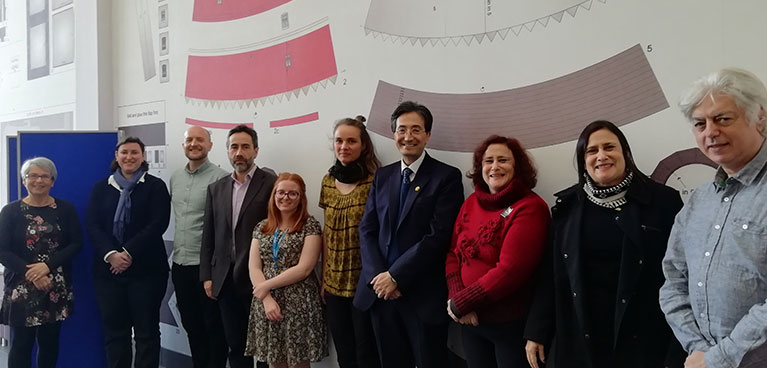South America Forum 2019
Authors Prof. Sue Charlesworth Assist. Prof. Sara Burbi
Organised by Professor Susanne Charlesworth and Assistant Professor Sara Burbi, both of the Centre for Agroecology, Water and Resilience (CAWR), the South America Forum “Research in South America: Challenges and Opportunities” took place on 30 April 2019 at the Simulation Centre, on Coventry University’s Technology Park.
Welcoming delegates to the event, CAWR’s Director, Professor Michel Pimbert emphasised Coventry University’s breadth of research in South America; the University has a South America Group with over 50 members and CAWR itself has a number of projects in Brazil, Colombia, Chile, Argentina and Ecuador, among others.
Minister Leopoldo Rovayo, Deputy Head of the Ecuadorian Mission to the UK opened the event by discussing the role of politics in the research process. It is, he said, all-pervasive. Funding is often linked to politics and governmental decisions need to consider sectors of society other than research (e.g. health, welfare, industry). Mr Rovayo’s speech highlighted the intrinsic link between research and politics that creates continuous challenges to carry out research in South America.
Our keynote speaker, Professor Juan Esteban Castro from Newcastle University gave a fascinating talk on “Water, inequality, and elusive democracy in South America” which provided a setting to the presentations to follow, allowing speakers to relate their work to a continent-wide context including violent and non-violent environmental protest, “water wars” and the potential achievement of the Sustainable Development Goals (SDGs).
There followed 3 dedicated sessions: Water Management, Water and Health and lastly Agroecological Perspectives; the 12 presentations illustrating the breadth of research. This ranged from drainage and flooding related to Sustainable Development Goal 6 (the Water SDG); the water and energy nexus in Brazil in the potential to produce energy from algae and wastewater; reducing disease vectors in favelas in Brazil by introducing Sustainable Drainage techniques and mapping the incidences of Zika and microcephaly to investigate the potential of a relationship between their distribution and “subnormal agglomerates”. Many of presentations given in this part of the forum represented support from a Newton Fund Collaborative Research Grant held at CAWR (PI: Charlesworth).
Other talks included the provision of fish passageways in Chile associated with large infrastructure such as dams as well as designing healthy cities and healthy buildings, with a particular focus on favelas, or subnormal agglomerations, in Brazil.
In terms of the agroecological session, delegates were treated to a Skype from researchers in Chile engaging with Mapuche and Diaguita indigenous communities to preserve native plants via a seed bank to ensure food sovereignty in the region. Related to indigenous knowledge, but in the Amazonian Forest, it was suggested that small-scale “cultural forests” may provide alternative spaces for development that is not sorely based on a productivist approach, but rather attempts to encompass aspects of society often considered contentious.
In Patagonia, forestry could be the answer to climate change whereas livestock farming along agroecological lines may preserve fragile ecosystems in South America which are currently under threat of decline.
The day ended with a presentation and discussion on the synergies and complexities of agroecology and its multifaceted applications. Examples of ecosystem regeneration through agroecological livestock farming included experiences in Mexico and in Colombia. The discussion then concluded the event, wrapping up key topics touched during the day and how difficult it is to work in highly politicised environments and to foster harmonisation of current and future policies.
We would like to acknowledge Coventry University who funded the room, and CAWR who paid for the refreshments.
Contributions available for download
Welcome: Professor Michel Pimbert, Director, Research Centre Agroecology, Water and Resilience (CAWR)
Opening: Minister Leopoldo Rovayo, Deputy Head of the Ecuadorian Mission to the United Kingdom.
South American research in context.
Keynote Speaker: Professor Jose Esteban Castro, Newcastle University
Water, inequality, and elusive democracy in South America.
Session 1 – Water Management
- Professor Susanne Charlesworth: Coventry University, CAWR, Stormwater and greywater management in favelas: are Sustainable Drainage Systems the answer?
- Professor Debora Cynamon Kligerman: Fiocruz, Rio de Janeiro, Brazil, Wastewater, algae and energy in Brazil.
- Dr Juan Pablo Rodríguez: University of Los Andes, Colombia, Integrated urban water resources management, Bogotá, Colombia.
- Professor Demetrios Christofidis: Secretaria Nacional de Segurança Hídrica, Ministério de Desenvolvimento Regional, Brazil, Water safety in Brazil.
Session 2 – Water and Health
- Associate Professor Matthew Blackett: Coventry University, ECE, CAWR, Mapping zika and microcephaly in NE Brazil.
- Rebecca Lewis: Coventry University Masters student: CAWR, The relationship between sanitation, drainage and the incidence of Zika in Brazil.
- Professor Simone Cynamon Cohen: Fiocruz, Rio de Janeiro, Brazil, Healthy and sustainable building methodology in Brazil.
- Assistant Professor Martin Wilkes: Coventry University, CAWR, There’s something fishy going on: Hydropower development and biodiversity in South America.
Session 3 – Agroecological Perspectives
- Dr Rodrigo Olave: Senior Scientific Officer at AFBI, Northern Ireland; Honorary
Research Fellow, CAWR, Agriculture and forestry under future climate change scenarios in Patagonia. - Esteban Órdenes Abarca: Alianza Nacional Biodiversidad Alimentaria
(National Alliance for Food Biodiversity), Chile, Traditional seeds saving initiatives by indigenous and peasant communities in Chile as foundation for food sovereignty. - Dr Nina Moeller: University of Manchester, Honorary Research Fellow, CAWR, ‘More-than-sustainable’ cultural forests of Amazonian pasts: the other side of the Anthropocene and the future human habitat.
- Assistant Professor Sara Burbi: Coventry University, CAWR, Ecosystem regeneration through agroecological livestock farming – Knowledge exchange between Central and South America.




Comments are disabled